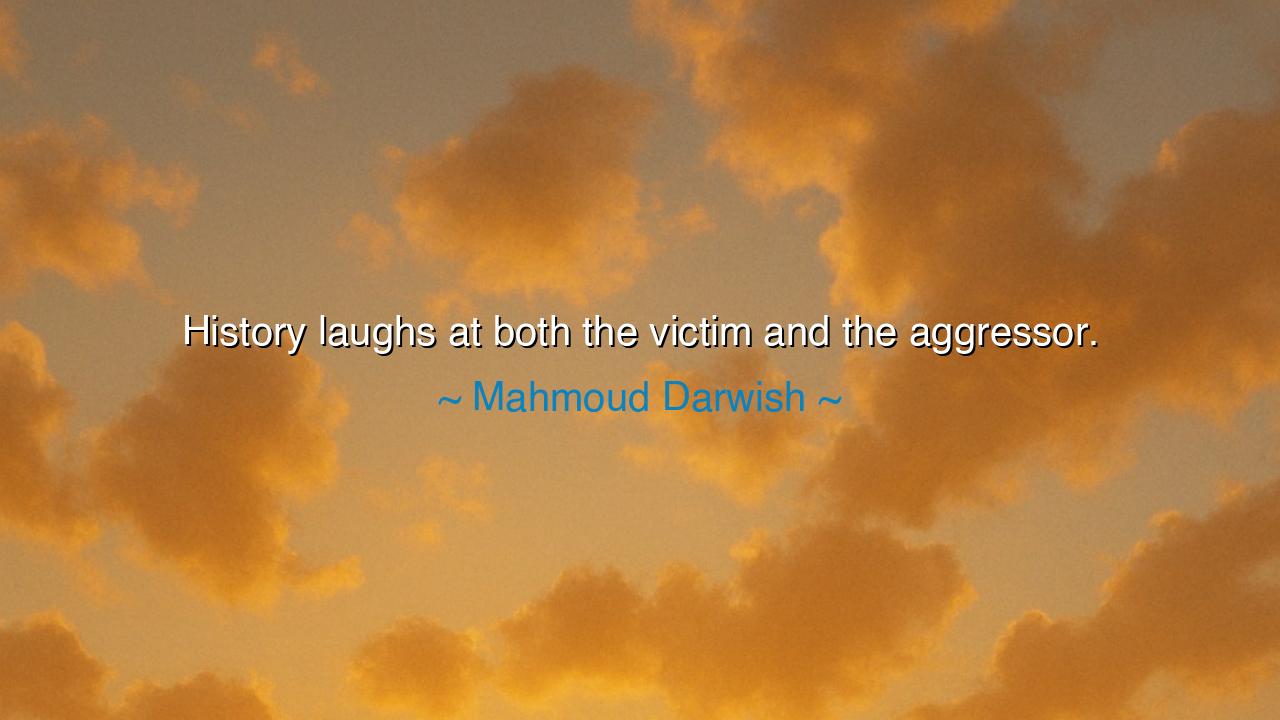
History laughs at both the victim and the aggressor.






“History laughs at both the victim and the aggressor.” — Thus wrote Mahmoud Darwish, the poet of exile, whose words carry the sorrow of the dispossessed and the wisdom of ages. In this brief and piercing statement, he captures a truth that transcends borders and generations: that history, the silent recorder of all human deeds, remains unmoved by our tears or triumphs. It watches as nations rise and fall, as men conquer and are conquered, and in the end, it laughs — not out of cruelty, but out of the eternal irony of human pride. For in the vastness of time, both the victor and the victim are swallowed by the same dust, their glories and their griefs reduced to memory.
To say that history laughs is to recognize its indifference. It has no heart to pity, no hand to bless. What we call victory today becomes tragedy tomorrow; what we call suffering becomes the seed of a new power. In the great turning wheel of time, roles reverse, empires crumble, the mighty become meek, and the meek inherit — if only for a moment — the power that destroys them in turn. Darwish, whose own people lived through occupation and loss, knew that history does not stand with either the oppressed or the oppressor forever. It records, it remembers, and then it moves on, leaving behind the lesson that all power, and all pain, are transient.
Consider the tale of Rome, the empire that once ruled the known world. Its legions conquered nations, enslaved peoples, and declared eternal dominion. Yet centuries later, Rome itself fell — not to some grand enemy, but to its own decay. The same lands it had enslaved rose again; the same blood it spilled gave birth to new nations. And when the ruins of its empire were found by later generations, history laughed — not in mockery, but in reminder. For all the grandeur and all the grief Rome caused, both the victors and the vanquished vanished alike into the dust.
So too with Napoleon, who sought to remake the world in his image. His armies stormed across Europe, reshaping nations with fire and ambition. Yet in the end, he was defeated, exiled, and remembered not as a god of war, but as a man undone by his own pride. And what of the millions he conquered, the victims of his endless campaigns? Their suffering, though vast and real, has also faded into the long silence of history. Time erases both the oppressor’s triumph and the oppressed’s pain, and in that fading, the eternal laughter of history can almost be heard — reminding us that no man, no nation, can escape its impartial gaze.
Darwish’s words are not cruel, though they are sharp. He does not belittle suffering; he reveals its futility when paired with vengeance or pride. Both the victim and the aggressor, he says, become bound in the same tragic dance — one driven by pain, the other by power — and both are devoured by time. His wisdom calls us to step outside this endless cycle, to see that justice cannot be born from hatred, and dignity cannot arise from domination. History may record our wars, but it forgets our mercy; it may echo our conquests, but it honors only our humanity.
In his own life, Darwish bore witness to this truth. As a Palestinian, he lived through exile and loss, yet his poetry never hardened into hatred. Instead, he wrote of compassion, of memory, of the human soul’s endurance beyond politics and power. He saw that both the conqueror and the conquered are trapped by the same tragedy: the belief that history will remember them kindly. But history has no favorites; it is the mirror of eternity, reflecting every act without judgment, waiting for us to understand that the only victory that endures is the victory of wisdom.
Let this be your lesson, my listener: do not seek vengeance, nor cling to victimhood, for both lead to oblivion. Live not to be remembered by history, but to be at peace with truth. The oppressor will one day fall, and the oppressed will one day rise — yet both shall pass away. What remains are not their wars, but their words; not their power, but their compassion. When you act in the world, act not to defeat others, but to transcend them — for that is the only path beyond history’s laughter.
And so, remember the wisdom of Mahmoud Darwish: that history laughs at both the victim and the aggressor, because it knows how swiftly the roles change, and how vain all struggle becomes when stripped of love. If you would escape that laughter, then live not for conquest nor for revenge, but for understanding. For while the victors write the chronicles and the victims write the elegies, it is only the wise — those who choose compassion over pride — whose spirit stands outside time, untouched by the cruel humor of history’s eternal smile.






AAdministratorAdministrator
Welcome, honored guests. Please leave a comment, we will respond soon